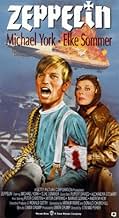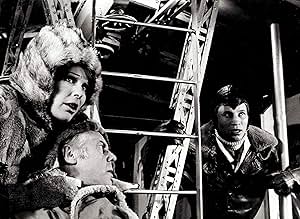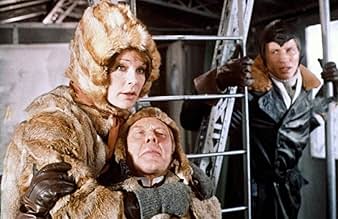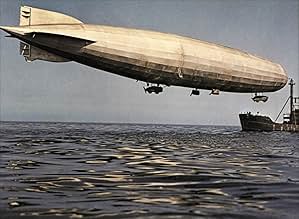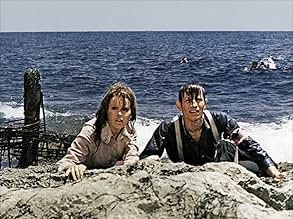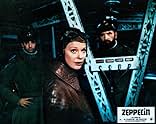CALIFICACIÓN DE IMDb
6.1/10
1.7 k
TU CALIFICACIÓN
En 1915, la inteligencia británica envía al oficial escocés Geoffrey Richter-Douglas a Alemania para buscar información sobre el último Zeppelin alemán.En 1915, la inteligencia británica envía al oficial escocés Geoffrey Richter-Douglas a Alemania para buscar información sobre el último Zeppelin alemán.En 1915, la inteligencia británica envía al oficial escocés Geoffrey Richter-Douglas a Alemania para buscar información sobre el último Zeppelin alemán.
- Dirección
- Guionistas
- Elenco
- Dirección
- Guionistas
- Todo el elenco y el equipo
- Producción, taquilla y más en IMDbPro
Opiniones destacadas
The movie is a fictionalized account from a German-born British official ( Michael York ) since his own point of view . He races against time to prevent a hateful scheme and thwart the plans of cunning , detestable baddies ( Anthon Driffing , Peter Carsten ). The Zeppelin made in scale model is the real star of the film , the enormous Blimp causes damages , wreak havoc , disrupts communications , rampage over cities and destroys vital points and gun positions, nowadays the Zeppelin is led a secret mission.
The film gets a magnificent creation of suspense , thriller and emotional drama including some exciting and well staged aerial images . A first rate cast with a valiant and sympathetic lieutenant well reincarnated by Michael York ( Three Musketeers , Cabaret ), a gorgeous beauty as Elke Sommer ( The prize ), her scientist husband old man ( Marius Goring of Red slippers) , Andrew Keir ( Quatermass and the Pit ) and of course the two top-notch devious villains as Anton Diffring and Peter Carsten , both of whom are usual in Nazi roles . Splendid aerial photography with impressive outdoors and sensational sky-shots by cameraman Alan Hume and good matte cinematography , besides fantastic maquettes of ingenious flying machine . Exceptional and atmospheric musical score by musician Roy Budd with extraordinary leitmotif as when the Zeppelin takes off from hangar . The picture is correctly directed by Etienne Perier . It's an acceptable picture and well produced with high budget and shot in Pinewood studies . Rating : Good , better than average .
The film gets a magnificent creation of suspense , thriller and emotional drama including some exciting and well staged aerial images . A first rate cast with a valiant and sympathetic lieutenant well reincarnated by Michael York ( Three Musketeers , Cabaret ), a gorgeous beauty as Elke Sommer ( The prize ), her scientist husband old man ( Marius Goring of Red slippers) , Andrew Keir ( Quatermass and the Pit ) and of course the two top-notch devious villains as Anton Diffring and Peter Carsten , both of whom are usual in Nazi roles . Splendid aerial photography with impressive outdoors and sensational sky-shots by cameraman Alan Hume and good matte cinematography , besides fantastic maquettes of ingenious flying machine . Exceptional and atmospheric musical score by musician Roy Budd with extraordinary leitmotif as when the Zeppelin takes off from hangar . The picture is correctly directed by Etienne Perier . It's an acceptable picture and well produced with high budget and shot in Pinewood studies . Rating : Good , better than average .
First---I want to say I have always enjoyed this movie since first seeing it some years ago. It explores some aspects of of a (relatively) little-know war i.e. World War I, and especially the use and technology of Zeppelins--which has been rare to non-existent in cinema.
Recently having purchased a video tape of the movie, I noticed something that has raised questions in my mind. In the movie, it is stated more times how critical weight is on a Zeppelin. For instance, when Richter-Douglas is first brought on board, Frau Altschul says "weight is critical on an airship--we haven't allowed for this man!" However, later when the Zeppelin has docked on the ship in the North Sea, a score or more of the men who are the "commandos" board the ship, and nothing is said about extra weight.
The only thing I can surmise is that the men who were to actually perform the commando raid in Scotland replaced the regular Zeppelin crew; who consequently disembarked and were left on the naval ship. If this happened in the movie or was mentioned, did I miss it?
Recently having purchased a video tape of the movie, I noticed something that has raised questions in my mind. In the movie, it is stated more times how critical weight is on a Zeppelin. For instance, when Richter-Douglas is first brought on board, Frau Altschul says "weight is critical on an airship--we haven't allowed for this man!" However, later when the Zeppelin has docked on the ship in the North Sea, a score or more of the men who are the "commandos" board the ship, and nothing is said about extra weight.
The only thing I can surmise is that the men who were to actually perform the commando raid in Scotland replaced the regular Zeppelin crew; who consequently disembarked and were left on the naval ship. If this happened in the movie or was mentioned, did I miss it?
For years, I had heard loosely about the use of zeppelins in WWI. Etienne Perier's movie "Zeppelin" does a very good job telling a specific story. It focuses on ancestrally-German Brit Geoffrey Richter-Douglas (Michael York) getting torn between allegiance to his native country and his ancestral land when he gets a chance to go to Germany to ride a zeppelin; he goes there, but of course doesn't tell his hosts that he's actually there as a UK agent. Then comes the ride aboard the zeppelin.
In my opinion, probably the movie's most interesting aspect is Elke Sommer's role. Throughout the '60s, she was one of the go-to women for sex kitten roles. Here, her character is Frau Dr. Erika Altschul, the wife of the zeppelin's inventor. She's a very educated, articulate woman not about to let anyone order her around. Granted, she's still quite pretty - and in one scene, we can see from her shadow on the wall that she's taking off her clothes! - but this is a totally different kind of role for her. Of course, I praise her for accepting a new kind of role for once.
Anyway, while this may not be the best movie ever, I certainly recommend it. Some of the early scenes give one the feeling of having been in England during WWI when the Germans were bombing (the truth is, we Americans have never experienced anything like that). Definitely worth seeing.
In my opinion, probably the movie's most interesting aspect is Elke Sommer's role. Throughout the '60s, she was one of the go-to women for sex kitten roles. Here, her character is Frau Dr. Erika Altschul, the wife of the zeppelin's inventor. She's a very educated, articulate woman not about to let anyone order her around. Granted, she's still quite pretty - and in one scene, we can see from her shadow on the wall that she's taking off her clothes! - but this is a totally different kind of role for her. Of course, I praise her for accepting a new kind of role for once.
Anyway, while this may not be the best movie ever, I certainly recommend it. Some of the early scenes give one the feeling of having been in England during WWI when the Germans were bombing (the truth is, we Americans have never experienced anything like that). Definitely worth seeing.
I've had a great affection for this film since I first saw it on tv, in the 70's. In my youth, I found it to be quite exciting and it spawned a lifelong interest in airships. The performances are good and the effects are good for their time and don't come across as too dated. The story is a bit murky. We never really feel that Michael York is that torn between his loyalties; rather, he seems more like a spy determined to perform his mission. His actions seem more motivated towards convincing the Germans that he believes in what they are doing, rather than being conflicted. The romantic angle is also a bit weak. It comes across more that York is fascinated with Elke Sommer, but not necessarily in love. She does not trust hims, nor does she seem attracted to him. It comes across as too ambiguous.
As far as the commando mission, it is an interesting idea, although the idea of a commando assault in the days before automatic weapons comes across as a bit absurd. Watching the German raiders trying to swing their rifles (with bayonets affixed, no less!) in enclosed spaces is a bit much. It is not impossible that a zeppelin could carry a raiding party. In the first place, it is only a squad that is taken aboard, not a battalion. Secondly, the zeppelin is not carrying a bomb load. Thirdly, the squad is taken aboard near Norway, and is not carried over the entire voyage; only after fuel has been used up. The logistics are sound; the motive for the attack may need some analysis.
The idea that the British would give up, due to the destruction of the Magna Carta and the crown jewels is a bit absurd. However, the thought that German soldiers could strike on British soil, and destroy national treasures, would be a great blow to British morale. World War I was not a very popular war in many circles in Britain. The stalemate in the trenches and the bombing raids on Britain had many people feeling that the war was a waste. A raid such of this would have at least caused the British to pull back some of their resources to defend their home, thereby weakening the front. It's an interesting possibility.
All-in-all, this is an entertaining film with fine performances. The flying sequences are quite well done. The plot is intriguing, if not wholly satisfying. Well worth a look.
As far as the commando mission, it is an interesting idea, although the idea of a commando assault in the days before automatic weapons comes across as a bit absurd. Watching the German raiders trying to swing their rifles (with bayonets affixed, no less!) in enclosed spaces is a bit much. It is not impossible that a zeppelin could carry a raiding party. In the first place, it is only a squad that is taken aboard, not a battalion. Secondly, the zeppelin is not carrying a bomb load. Thirdly, the squad is taken aboard near Norway, and is not carried over the entire voyage; only after fuel has been used up. The logistics are sound; the motive for the attack may need some analysis.
The idea that the British would give up, due to the destruction of the Magna Carta and the crown jewels is a bit absurd. However, the thought that German soldiers could strike on British soil, and destroy national treasures, would be a great blow to British morale. World War I was not a very popular war in many circles in Britain. The stalemate in the trenches and the bombing raids on Britain had many people feeling that the war was a waste. A raid such of this would have at least caused the British to pull back some of their resources to defend their home, thereby weakening the front. It's an interesting possibility.
All-in-all, this is an entertaining film with fine performances. The flying sequences are quite well done. The plot is intriguing, if not wholly satisfying. Well worth a look.
While I will admit that the plot of ZEPPELIN is okay and not the best I have ever seen, I still like this movie a lot. Michael York plays a British agent that pretends to defect in order to learn the German airship secrets. Along the way he meets the extremely attractive Elke Sommer, though what all that has to do with war, I never was really certain.
The film concerns an era that we seldom talk about--WWI and the terror that seized the Allies when the Germans first rained bombs on an unsuspecting London. For the life of me, I can't recall another movie that mentions this in any way, so historically speaking this is an important topic.
I was fortunate enough to have seen this film on the big screen when it first came out in the very early 1970s. I remember sitting in the first row in the balcony and watching the big screen as the Zeppelin first appeared up out of the clouds--pretty reminiscent of the shark attacking in the later film, JAWS! Much of the film is set on the dirigible, the scenery is great and the Zeppelin scenes are pretty realistic. Give it a try--it's a forgotten and worthwhile film.
The film concerns an era that we seldom talk about--WWI and the terror that seized the Allies when the Germans first rained bombs on an unsuspecting London. For the life of me, I can't recall another movie that mentions this in any way, so historically speaking this is an important topic.
I was fortunate enough to have seen this film on the big screen when it first came out in the very early 1970s. I remember sitting in the first row in the balcony and watching the big screen as the Zeppelin first appeared up out of the clouds--pretty reminiscent of the shark attacking in the later film, JAWS! Much of the film is set on the dirigible, the scenery is great and the Zeppelin scenes are pretty realistic. Give it a try--it's a forgotten and worthwhile film.
¿Sabías que…?
- TriviaThe LZ36 of history first flew on 8 March 1915 and was operated by the German navy (not the army) as 'L9'. The ship carried out 74 reconnaissance missions in the North Sea, four air-raids on England dropping 5683kg of bombs, and several attacks on British submarines. It caught fire and was destroyed in its shed at Fuhlsbuttel on 16 September 1916 together with L6.
- ErroresOne primary goal of the mission is to destroy "the" Magna Carta, thus demoralizing the British people. However, unlike the U.S. Constitution, the Magna Carta is not a single document but a series of nearly identical charters issued by royal seal. There were 11 "originals," each considered equally original, issued in 1215, of which 4 still survive. There were additional "exemplifications" issued under royal seal throughout the 13th Century, of which 20 more also survive. The destruction of a single version would, therefore, fail to accomplish the German mission of destroying the document.
- Citas
Geoffrey von Richter-Douglas: Where are the parachutes?
Frau Dr. Ericka Altschul: What parachutes?
Geoffrey von Richter-Douglas: Well, for emergencies. How do you get out of here quickly?
Von Gorian: Jump!
- ConexionesReferenced in The Magnificent Seven Deadly Sins (1971)
Selecciones populares
Inicia sesión para calificar y agrega a la lista de videos para obtener recomendaciones personalizadas
- How long is Zeppelin?Con tecnología de Alexa
Detalles
- Fecha de lanzamiento
- País de origen
- Idioma
- También se conoce como
- Zeppelin - Das fliegende Schiff
- Locaciones de filmación
- Productora
- Ver más créditos de la compañía en IMDbPro
- Tiempo de ejecución1 hora 40 minutos
- Mezcla de sonido
- Relación de aspecto
- 2.35 : 1
Contribuir a esta página
Sugiere una edición o agrega el contenido que falta

Principales brechas de datos
By what name was Zeppelin (1971) officially released in India in English?
Responda

